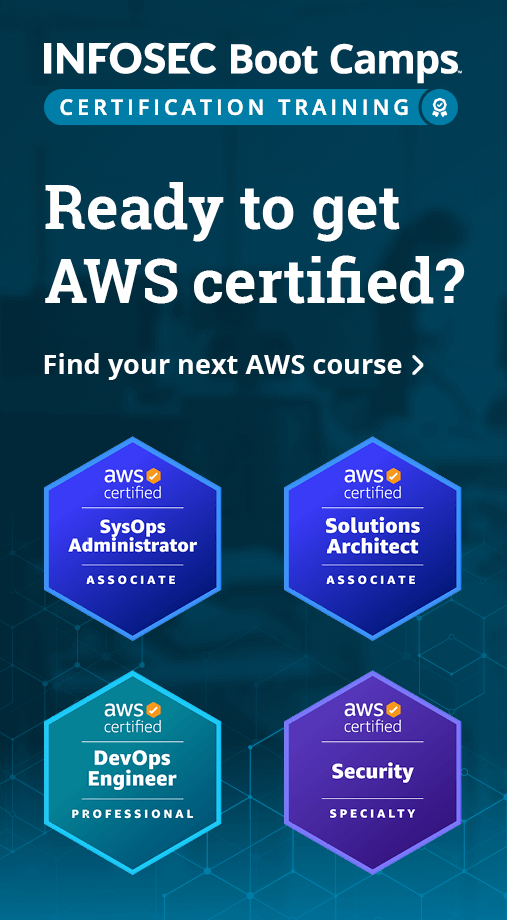AWS Certified Security Engineer Salary: Current trends & projections
The need for cloud security is growing as companies digitally transform or modernize their systems using the cloud. In fact, Gartner® reports that “worldwide end-user spending on public cloud services is forecast to grow 20.4% to total $678.8 billion in 2024.” As that grows, every app, network and storage resource in the cloud presents a potential vulnerability, and IT and security teams are eager to mitigate them.
AWS has become the market leader when it comes to cloud provisioning. Organizations around the world host their digital infrastructure in AWS. Therefore, AWS certifications like the AWS Certified Security Engineer can position you to ride the cloud wave into a more prosperous future.
Earn your AWS certification, guaranteed!
From Certified Solutions Architect to Cloud Operations Administrator, get your AWS certification backed with an Exam Pass Guarantee.
Understanding the AWS Certified Security certification
The AWS Certified Security certification is designed for those with several years of IT security experience in building and deploying security solutions and at least two years of hands-on experience protecting AWS workloads. It’s a specialty certification intended for experienced professionals who want to assume leadership roles or boost their income by providing a more comprehensive array of AWS security solutions.
Those who hold this certification may qualify to:
- Architect cloud security solutions
- Develop cloud security in the AWS system
- Be an AWS cloud security consultant
- Troubleshoot AWS cloud security issues
- Prevent and mitigate attacks that occur in the AWS cloud environment
Factors influencing salary
Several factors may influence your AWS cloud security engineer salary, and understanding them helps put the numbers below into context. For instance, your compensation may be affected by:
- The amount of experience you have working in cybersecurity in general or AWS environments.
- The organization’s geographic location is important because some areas command more competitive salaries than others.
- Your education level or certifications, such as this one or other AWS certifications. A richer educational background can sometimes increase your AWS engineer's salary.
Average AWS security engineer salary data and trends
The following data was compiled using these sources:
- Payscale.com, which has an average base salary of $124,333 for information security engineers with AWS skills
- Salary.com, which has an average base salary of $118,355 for AWS security engineers
- Glassdoor.com, which has an average base salary of $127,385 and an average additional compensation of $27,804, including benefits like bonuses and stock options
Based on this data, those with an AWS Certified Security – Specialty certification can expect a rough total salary of around $133,488. However, as the Glassdoor data indicates, the total can vary quite a bit based on bonuses, stock options and other benefits.
Salaries by location
The area where you work can significantly impact your salary due to differences in the cost of living and demand for cloud security specialists. For example, according to Salary.com, in Massachusetts, you can expect to earn an average of $128,479, but your pay may be much higher in Santa Clara, California, at $148,199.
Moving over to Franklin, Tennessee, you’d earn an average of $110,884, and, not too far away, in Bowling Green, Kentucky, the pay drops a little lower to $107,013.
To give you a broader view of the pay across the country, here are some figures for AWS cloud security professionals in other areas:
- San Francisco, California: $147,609
- Washington, DC: $131,431
- Miami, Florida: $113,954
- Chicago, Illinois: $123,873
- Boston, Massachusetts: $132,375
- New York, New York: $137,926
Salaries by experience
Your pay as an AWS Certified Security Engineer may also vary based on how much experience you have in your field. Here are some stats from Glassdoor to give you an idea of what to expect:
- 0-1 years: $112,000
- 1-3 years: $129,000
- 4-6 years: $143,000
- 7-9 years: $150,000
- 10-14 years: $168,000
- 15+ years: $182,000
Salary by industry
The industry a company is in may impact how much it must budget to pay an AWS Security Engineer due to the degree of need, responsibilities and workload. For instance, if you work in the legal industry, you can earn around $145,000 per year, according to Glassdoor. However, your compensation would jump up another $14,000 if you were to work in the pharmaceutical industry, hitting an average of $159,000.
Earn your AWS certification, guaranteed!
From Certified Solutions Architect to Cloud Operations Administrator, get your AWS certification backed with an Exam Pass Guarantee.
Career opportunities for AWS security engineers
After earning your AWS security certification, many doors may open, giving you several career options. Here are some examples to give you an idea:
- A senior AWS security engineer at DISH earns $158,653
- An AWS engineer — network security professional at Capgemini earns $115,574
- An AWS security engineer, AWS cloud security response employee at Amazon, earns $142,652
AWS career pathways and progression
Even though your AWS Certified Security certification is a specialty credential that puts you at the higher end of the experience scale, there are still multiple ways to grow your career using the AWS ecosystem. If you’re just starting, you can leverage the company’s Foundational certification to certify you have basic knowledge of the AWS environment.
Moving up a level, you get to the associate certifications aimed at those with one to two years of experience. To focus on securing AWS environments in a more specific context, consider the Solutions Architect, Developer, Data Engineer or SysOps Administrator certifications.
At the next level up, you find the professional certifications, which are for those with a few years of experience in their field under their belt. You can opt for the Solutions Architect — Professional or DevOps Engineer — Professional certifications. These could be useful if you want to specialize in providing security solutions for a development team or to advise AWS architects regarding how to safeguard the environments they build.
Preparing for the AWS Certified Security — Specialty exam
The AWS Certified Security — Specialty exam consists of 65 questions that are either multiple choice or multiple responses. With multiple-choice questions, you choose the best answer, and multiple-response questions require you to select more than one answer to completely satisfy the question’s requirements.
You’re allotted 170 minutes to answer all the questions, and you either pass or fail the exam.
The exam is broken down into six domains:
- Domain 1: Threat Detection and Incident Response (14% of scored content)
- Domain 2: Security Logging and Monitoring (18% of scored content)
- Domain 3: Infrastructure Security (20% of scored content)
- Domain 4: Identity and Access Management (16% of scored content)
- Domain 5: Data Protection (18% of scored content)
- Domain 6: Management and Security Governance (14% of scored content)
To prepare, it’s best to focus on the domains that may give you the most trouble. For example, this may be a relatively strong area if you’ve designed identity and access management systems in the past. But you may have little experience with threat detection and response. By studying for this domain, you establish a more solid baseline of knowledge, which can boost your score.
How you train for the exam will also depend on what you know, what you have to learn and how much time you have. One option is to use an AWS Certified Security Engineer Boot Camp. This gives you a deep understanding of the exam, how it works and preparation strategies. You also get the chance to work through problems in a hands-on environment, which helps reinforce your knowledge.
One advantage of a boot camp is that you can take advantage of professional, guided learning, and the experiences and input of others in the course. Learning with a professional guide and alongside peers often results in better outcomes.
For some learning styles, guided instruction is best, and for others, a self-guided approach may be more effective. For example, you could purchase specially designed exam prep materials and review them independently and at your own pace.
You could also buy a book (or go to the library) and use it to prepare. You should be able to find one with practice questions and a thorough breakdown of each exam section.
As you form your preparation strategy, here are some skills you’ll want to keep in mind:
- Understanding the responsibilities and benefits associated with the AWS cloud
- Knowing how access control and management work in the AWS environment
- Understanding the different methods of encrypting sensitive data in a cloud environment
- Figuring out which AWS services you can use for security monitoring and logging
- Describing how to secure network access to AWS resources
Even if you’re relatively new to the cloud security field, getting your AWS Certified Security credential can escalate your earnings to the next level by signaling to your employers that you have the verified knowledge and skills to bring AWS security skills to their organization.
Earn your AWS certification, guaranteed!
From Certified Solutions Architect to Cloud Operations Administrator, get your AWS certification backed with an Exam Pass Guarantee.
AWS security engineer salary conclusion
The AWS Security Engineer cert gives experienced professionals a distinct advantage over others in the job market because it demonstrates mastery over securing AWS environments. This certification can give you a significant strategic advantage if you’re looking to boost your hiring prospects, especially from the perspective of companies undergoing or managing digital cloud transformations.
For more information, check out our webinar, AWS Certified Security - Specialty: What it is and how to get certified.





